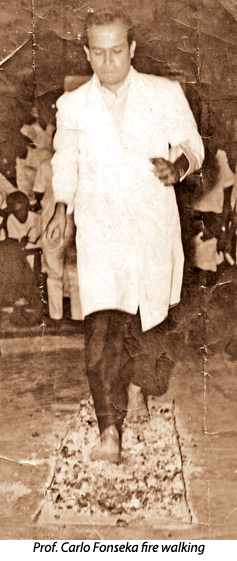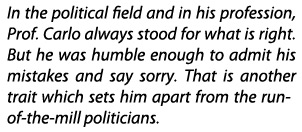
Emeritus Prof. Carlo Fonseka was a rebel with a cause. A doctor, a man of letters and a lover of the arts, he had another ace up his sleeve: Political Activism. And he literally did not give it up even on his final journey – to the Medical Faculty at Ragama (attached to the Kelaniya University) – where coincidentally, he was the first dean. Prof. Carlo outlined two final wishes to his immediate family – his mortal remains should be handed over to the Medical Faculty in the furtherance of science education and he should be dressed in a red shirt. Of course, his family obliged on both counts.
True leftist

 Even in death, Prof. Carlo did not want to hide his Leftist leanings. A lifelong member of the Trotskyist Sri Lanka Sama Samaja Party, he was in the thick of the Leftist movement in Sri Lanka. (He never stood for election to a political body, though). Although the fortunes of the Leftist Movement in this country fluctuated widely, Prof. Carlo was steadfast in his belief that socialism was the cure for the country’s (and the world’s) ills. He never wavered in his socialist ideology and beliefs. In fact, this writer last saw him at the funeral of journalist and committed Leftist Jayatilleke de Silva, where he was seen in animated conversation with several leading figures from the contemporary Leftist Movement.
Even in death, Prof. Carlo did not want to hide his Leftist leanings. A lifelong member of the Trotskyist Sri Lanka Sama Samaja Party, he was in the thick of the Leftist movement in Sri Lanka. (He never stood for election to a political body, though). Although the fortunes of the Leftist Movement in this country fluctuated widely, Prof. Carlo was steadfast in his belief that socialism was the cure for the country’s (and the world’s) ills. He never wavered in his socialist ideology and beliefs. In fact, this writer last saw him at the funeral of journalist and committed Leftist Jayatilleke de Silva, where he was seen in animated conversation with several leading figures from the contemporary Leftist Movement.
As a commentator and analyst of social and political issues, he was not apprehensive of getting in the cross hairs of political forces that were much stronger. For example, it took a long time for the UNP to shed the sarcastic moniker given by Prof. Carlo – Unge Nedeyange Pakshaya which literally means a Party of Relatives. When the Government in power at the time seemed adamant over the issue of the North Colombo Medical College (NCMC), Prof. Carlo led a campaign against it that finally resulted in it being absorbed to the Kelaniya University as its Medical Faculty. As already mentioned, he became its first dean. Much later, Prof. Carlo opposed the South Asian Institute of Medicine and Technology (SAITM) and it was a relief for him that the issue was resolved within his lifetime. However, he mellowed his strict opposition to the concept over time.
Superb orator
Prof. Carlo was one of the best orators in the country, being equally fluent and lucid in both Sinhala and English. While he was a regular speaker at almost all the book and song compilation launches in Colombo (the events would not be complete without a keynote address from him), he was equally at home on the political platform. His incisive knowledge and insightful analysis of political and social issues was like a breath of fresh air in a political landscape filled with balderdash.
There were many who attended such forums just to listen to Prof. Carlo, who had the unique ability to explain even complex political issues in a way that ordinary people could comprehend. His speeches were peppered with wisdom throughout, making it even more enjoyable to listen to.
One of his most memorable speeches was not even political – his eulogy at the funeral of the late movie star turned politician Vijaya Kumaratunga, to whom he was closely related. This emotional eulogy at Vijaya’s funeral will long be remembered by those who saw it on television (it broke viewership records in February 1988). This close relationship was to lead to some discomfort for him later on during the Anura Bandaranaike-Mahinda Rajapaksa tussle in the SLFP, as Prof. Carlo was seen to be aligned more with Rajapaksa. However, he refrained from openly siding with either of the two and remained more or less neutral.
One after effect of his speech at Vijaya’s funeral was that many close to him feared for his life following his strong condemnation of the alleged perpetrators of the cold blooded assassination during his speech. At the urging of his loved ones and close associates, he left for Finland to take up an appointment at the UN University in Helsinki. He saved some money from this trip and used it to build a modest house. This and a small car remained his biggest worldly possessions, at a time when some of the people he knew from the political world had become mega-rich almost overnight.
In fact, Prof. Carlo could have made millions if he switched his allegiance to various political parties and forces in tune with the prevailing political winds, but his lifelong commitment as a Leftist loyal to the LSSP meant that he never even entertained such thoughts. He could not even visit many Western countries in an official or private capacity as the Embassy staff viewed his Leftist credentials with suspicion and refused to give him the visas.
In the political field and in his profession, Prof. Carlo always stood for what is right. But he was humble enough to admit his mistakes and say sorry. That is another trait which sets him apart from the run-of-the-mill politicians. One example comes from his seminal work “Essays of a Lifetime” where under the Chapter to “Err Was Fatal” he describes five patient deaths which he attributes to erroneous interventions and judgments on his part. Not many would do this.
Reality and rationalism
Prof. Carlo was also careful not to mix religion with his political views. Although brought up in a Catholic environment, he gained a deep and intimate knowledge of Buddhism later on. (He received an MA in Buddhism). But it would not be incorrect to describe him as a “secular” individual who abhorred that heady mix of religion and communalism which politicians use to whip up their electorates and win votes. Prof. Carlo was indeed known for standing up for the rights of minority communities. However, when some in his party realised that a little bit of communalist rhetoric went a long way in local politics, Prof. Carlo did not want to involve himself in such activities.
Prof. Carlo also brought into public discourse and politics a dose of reality and rationalism. Politicians generally dabble in unrealistic propositions and superstitious rituals, both of which were flatly rejected by Prof. Carlo. His famous fire walking experiment after a tryst with Bacchus with animal flesh on the side was the highlight of a BBC documentary filmed in the presence of none other than Sir Arthur C Clarke.
This cemented his reputation as a realist and rationalist and along with the famed Indian rationalist Abraham T Kovoor, Prof. Carlo did a lot of work debunk many myths that the society had embraced. However, he was careful not to hurt the sentiments of any community or religious group in doing so.
Being a doctor as well as a political activist who moved closely with the top echelons of a given administration gave him the added advantage of being able to influence some of the political decisions taken in respect of the health sector.
For example, he was an ardent campaigner against alcohol and tobacco (having held the leadership of several government agencies working in this sector) and was instrumental in the drafting of many laws that sought to prevent such substance abuse. Prof. Carlo did not admire many politicians, but he had a great affinity for Dr. N.M. Perera.
Among the others (all non-politicians) he admired were Kovoor, the celebrated surgeon Dr. P.R. Anthonis and Buddhist reformer Dr. A.P. de Zoysa. He of course admired art and artistes (an article on his contribution to the arts appears elsewhere in this newspaper). Musicians of the calibre of Amaradeva and Nanda Malani were among his close friends.
In fact, music was the elixir that kept him bright and active until 86. Unlike many others who dipped their fingers in politics, Prof. Carlo lived a rather simple but eventful life. His contribution to the country’s body politic will not be forgotten. Sri Lanka will miss him for all the right reasons.
